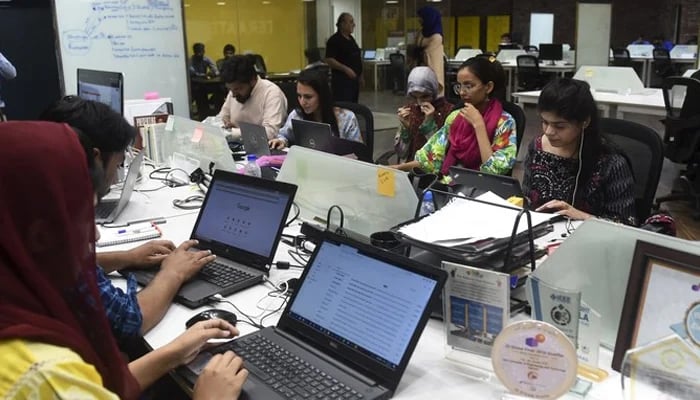Towards progress
Women form 49.7 per cent of the population of the world. The percentage, with slight variations, has been almost similar throughout history. Ironically, in our journey from the Stone Age to the era of artificial intelligence, this half population remained denied commensurate knowledge, skill and responsibilities.
The word empowerment connotes the presence of a competent body giving out authority through social norms and laws. Pakistan recognized the deficit of rights for women and developed legal and executive measures to combat that.
As equal citizens of Pakistan, women are free to contest general elections and also avail the seats reserved for them. We had only three women in our first National Assembly (1947-54), 6-8 women till 1999 and 70-76 members (elected and reserved) from 2002 to date. Similar representation is found in the Senate.
There are no limits on women holding public office in Pakistan. Benazir Bhutto rose to the position of PM, while several others continue working as ministers and heads of institutions. The contribution of women has been appreciable and inspired the coming generations.
Women always contributed towards the economy but their labour was not properly evaluated. In rural areas, about 70 per cent of the country, women worked in the fields and looked after the cattle, thereby substantially supporting these two major sources of field economy. The use of modern agriculture equipment and techniques relieved a large number of this class of women from labour in the fields. They have consequently diverted their attention towards education. One can see a significant change in rural areas over the past two decades.
In most competitive exams, girls and women have proved to be more focused and successful. When put to practical life, their performance in the bureaucracy, and the health and education sectors is particularly noteworthy. Women have shown a lot of vision in the corporate sector as well and have proved themselves to be leading entrepreneurs and business leaders.
Young women have also joined the armed forces and demonstrated their worth in the uniform, forming a formidable segment of our valiant armed forces.
Women’s empowerment in Pakistan is facilitated by state laws. Our progress in this can be seen in the World Economic Forum’s Global Gender Gap reports which indicate that our gender gap in educational attainment has significantly decreased with more girls enrolling in schools and pursuing higher education. This forms the basis for women managing to contribute to all fields of life.
We have in place systems to provide financial assistance to vulnerable women, opportunities to the struggling, and guidance to those looking for a path to progress. These systems include skill development programmes and microfinance initiatives.
The writer is a freelance writer and TV anchor.
-
 Cuba-Canada Travel Advisory Raises Concerns As Visitor Numbers Decline
Cuba-Canada Travel Advisory Raises Concerns As Visitor Numbers Decline -
 Anthropic Buys 'Super Bowl' Ads To Slam OpenAI’s ChatGPT Ad Strategy
Anthropic Buys 'Super Bowl' Ads To Slam OpenAI’s ChatGPT Ad Strategy -
 Prevent Cancer With These Simple Lifestyle Changes
Prevent Cancer With These Simple Lifestyle Changes -
 Air Canada Flight Diverted St John's With 368 Passengers After Onboard Incident
Air Canada Flight Diverted St John's With 368 Passengers After Onboard Incident -
 Experts Reveal Keto Diet As Key To Treating Depression
Experts Reveal Keto Diet As Key To Treating Depression -
 Inter Miami Vs Barcelona SC Recap As Messi Shines With Goal And Assist
Inter Miami Vs Barcelona SC Recap As Messi Shines With Goal And Assist -
 David Beckham Pays Tribute To Estranged Son Brooklyn Amid Ongoing Family Rift
David Beckham Pays Tribute To Estranged Son Brooklyn Amid Ongoing Family Rift -
 Jailton Almeida Speaks Out After UFC Controversy And Short Notice Fight Booking
Jailton Almeida Speaks Out After UFC Controversy And Short Notice Fight Booking -
 Extreme Cold Warning Issued As Blizzard Hits Southern Ontario Including Toronto
Extreme Cold Warning Issued As Blizzard Hits Southern Ontario Including Toronto -
 Lana Del Rey Announces New Single Co-written With Husband Jeremy Dufrene
Lana Del Rey Announces New Single Co-written With Husband Jeremy Dufrene -
 Ukraine-Russia Talks Heat Up As Zelenskyy Warns Of US Pressure Before Elections
Ukraine-Russia Talks Heat Up As Zelenskyy Warns Of US Pressure Before Elections -
 Lil Nas X Spotted Buying Used Refrigerator After Backlash Over Nude Public Meltdown
Lil Nas X Spotted Buying Used Refrigerator After Backlash Over Nude Public Meltdown -
 Caleb McLaughlin Shares His Resume For This Major Role
Caleb McLaughlin Shares His Resume For This Major Role -
 King Charles Carries With ‘dignity’ As Andrew Lets Down
King Charles Carries With ‘dignity’ As Andrew Lets Down -
 Brooklyn Beckham Covers Up More Tattoos Linked To His Family Amid Rift
Brooklyn Beckham Covers Up More Tattoos Linked To His Family Amid Rift -
 Shamed Andrew Agreed To ‘go Quietly’ If King Protects Daughters
Shamed Andrew Agreed To ‘go Quietly’ If King Protects Daughters




